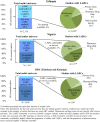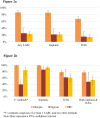Leveraging long acting reversible contraceptives to achieve FP2020 commitments in sub-Saharan Africa: The potential of implants
- PMID: 29630607
- PMCID: PMC5891008
- DOI: 10.1371/journal.pone.0195228
Leveraging long acting reversible contraceptives to achieve FP2020 commitments in sub-Saharan Africa: The potential of implants
Abstract
Background: In developing regions, an estimated 214 million women have an unmet need for family planning. Reaching Family Planning 2020 (FP2020) commitments will require a shift in modern contraceptive promotion, including improved access to long-acting reversible contraceptives (LARCs). Until now, a lack of market data limited understanding of the potential of LARCs to increase contraceptive access and choice.
Methods: From 2015, the FPwatch Project conducted representative surveys in Ethiopia, Nigeria, and Democratic Republic of Congo (DRC) using a full census approach in selected administrative areas. In these areas, every public and private sector outlet with the potential to sell or distribute modern contraceptives was approached. In outlets with modern contraceptives, product audits and provider interviews assessed contraceptive market composition, market share, availability, price, and outlet readiness to perform services.
Results: Fifty-four percent of outlets in Ethiopia had LARC commodities or services available at the time of the survey, versus 7% and 8% of outlets in Nigeria and DRC, respectively. When present, LARCs were usually available with at least two other methods (99%, 39%, and 84% of public health facilities in Ethiopia, Nigeria and DRC, respectively). Many public facilities had both implants and IUDs in stock (76%, 47%, and 53%, respectively). Lack of readiness to provide LARCs was mostly due to a lack of equipment, private room, or the commodity itself. Market share for implants in the public sector was 60%, 53%, and 37% of Couple Years of Protection (CYP) in Ethiopia, Nigeria, and DRC.
Discussion: Limited availability of LARCs in Nigeria and DRC restricts contraceptive choice and makes it difficult for women to adopt and use modern contraception consistently. Brand-specific subsidies, task shifting, and promotion of methods that require less equipment and training are promising strategies for increasing uptake. Substantial government investment is required to improve availability and affordability. Investment in implants should be prioritized to make progress towards FP2020 commitments.
Conflict of interest statement
Figures




References
-
- Adding It Up: Investing in Contraception and Maternal and Newborn Health, 2017 [Internet]. New York, NY; Guttmacher Institute; 2017. [cited 2017 July 26]. https://www.guttmacher.org/fact-sheet/adding-it-up-contraception-mnh-2017
-
- Tsui AO, McDonald-Mosley R, Burke AE. Family planning and the burden of unintended pregnancies. Epidemiol Rev. 2010;32:152–74 doi: 10.1093/epirev/mxq012 - DOI - PMC - PubMed
-
- Family Planning 2020: About Us. [Internet]. Family Planning 2020. [cited 2017Aug1]. http://www.familyplanning2020.org/microsite/about-us
-
- World Health Organization. From Evidence to Policy: Expanding Access to Family Planning: Strategies to increase use of long-acting and permanent contraception. Geneva, Switzerland: World Health Organization; 2012. 4 p. Report No.:12.20.
-
- Long-Acting Reversible Contraceptives: An Important Focus at the 2016 International Conference on Family Planning. Global Health: Science and Practice. 2016;4(Suppl 2): S1 Available from: doi: 10.9745/GHSP-D-16-00241 - DOI - PMC - PubMed
Publication types
MeSH terms
Substances
LinkOut - more resources
Full Text Sources
Other Literature Sources
Medical
Miscellaneous

